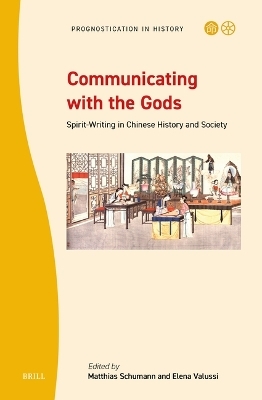
Communicating with the Gods
Brill (Verlag)
978-90-04-54904-3 (ISBN)
Few religious innovations have shaped Chinese history like the emergence of spirit-writing during the Song dynasty.
From a divinatory technique it evolved into a complex ritual practice used to transmit messages and revelations from the Gods. This resulted in the production of countless religious scriptures that now form an essential corpus, widely venerated and recited to this day, that is still largely untapped by research.
Using historical and ethnographic approaches, this volume for the first time offers a comprehensive overview of the history of spirit-writing, examining its evolution over a millennium, the practices and technologies used, and the communities involved.
Matthias Schumann is postdoctoral research fellow at Heidelberg University. His research deals with the interconnections between religion, society and politics in modern Chinese history. He is author of several articles and co-editor of Protecting the Weak in East Asia: Framing, Mobilisation and Institutionalisation (Routledge, 2018). Elena Valussi is a senior Lecturer at Loyola University Chicago. She has published extensively on the intersection between religion, gender and the body in China, on Daoist intellectual history and on spirit writing in China. She is the Vice- President of the Society for the Study of Chinese Religions.
Acknowledgments
List of Figures and Tables
Note on Formal Conventions
Dynastic Table
1 Introduction to the Volume
Matthias Schumann and Elena Valussi
Part 1 Overview Papers
2 Making the Gods Write: A Short History of Spirit-Written Revelations in China, 1000–1400
Vincent Goossaert
3 Spirit-Writing Practices from the Song to Ming Periods and Their Relation to Politics and Religion
Wang Chien-chuan 王 見川
4 Women, Goddesses, and Gender Affinity in Spirit-Writing
Elena Valussi
Part 2 Changing Techniques and Practices
5 Terminology and Typology of Spirit-Writing in Early Modern China: A Preliminary Study
Hu Jiechen
6 The Transcendent of the Plate
The Lingji zhimi 靈乩指迷 (Instructions on the numinous stylus) and the Reform of Spirit-Writing Techniques during the First Half of the Twentieth Century
Fan Chun-wu 范 純武
Part 3 Spirit-Writing and the Literati Elites in Late Imperial China
7 Instantiating the Genealogy of the Way: Spirit-Writing in the Construction of Peng Dingqiu’s Confucian Pantheon
Daniel Burton-Rose
8 A Credulous Skeptic: Ji Yun on the Mantic Arts and Spirit-Writing
Michael Lackner
9 The Liu-Han Altar: Between a Literati Spirit-Writing Altar and Popular Religion
Zhu Mingchuan 朱 明川
Part 4 Spirit-Writing and Redemptive Societies
10 “Protecting the Dao and Transmitting the Classics”
The New Religion to Save the World and the Confucian Dimension of Spirit-Writing in Republican China
Matthias Schumann
11 Spirit-Writing and the Daoyuan’s Gendered Teachings
Xia Shi
12 The Phoenix Perches in the Land of the Kami: Spirit-Writing from Yiguandao to Tendō
Nikolas Broy
Part 5 Local Communities and Transregional Networks
13 The Nineteenth Century Spirit-Writing Movement and the Transformation of Local Religion in Western Guangdong
Ichiko Shiga
14 The Rise of Spirit-Writing Cults in Chaozhou: Reassessing the Role of Charitable Halls
Li Guoping 李 國平
15 Spirit-Writing Altars in Contemporary Hong Kong: A Case Study of Fei Ngan Tung Buddhism and Daoism Society
Luo Dan 羅 丹
16 A Motley Phoenix? On the Diversity of Spirit-Writing Temples and Their Practices in Puli, Taiwan
Paul R. Katz
Index
| Erscheinungsdatum | 18.10.2023 |
|---|---|
| Reihe/Serie | Prognostication in History ; 11 |
| Verlagsort | Leiden |
| Sprache | englisch |
| Maße | 155 x 235 mm |
| Gewicht | 1236 g |
| Themenwelt | Sachbuch/Ratgeber ► Gesundheit / Leben / Psychologie ► Esoterik / Spiritualität |
| Geisteswissenschaften ► Philosophie ► Östliche Philosophie | |
| Geisteswissenschaften ► Religion / Theologie ► Weitere Religionen | |
| ISBN-10 | 90-04-54904-8 / 9004549048 |
| ISBN-13 | 978-90-04-54904-3 / 9789004549043 |
| Zustand | Neuware |
| Haben Sie eine Frage zum Produkt? |
aus dem Bereich


